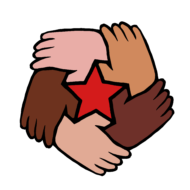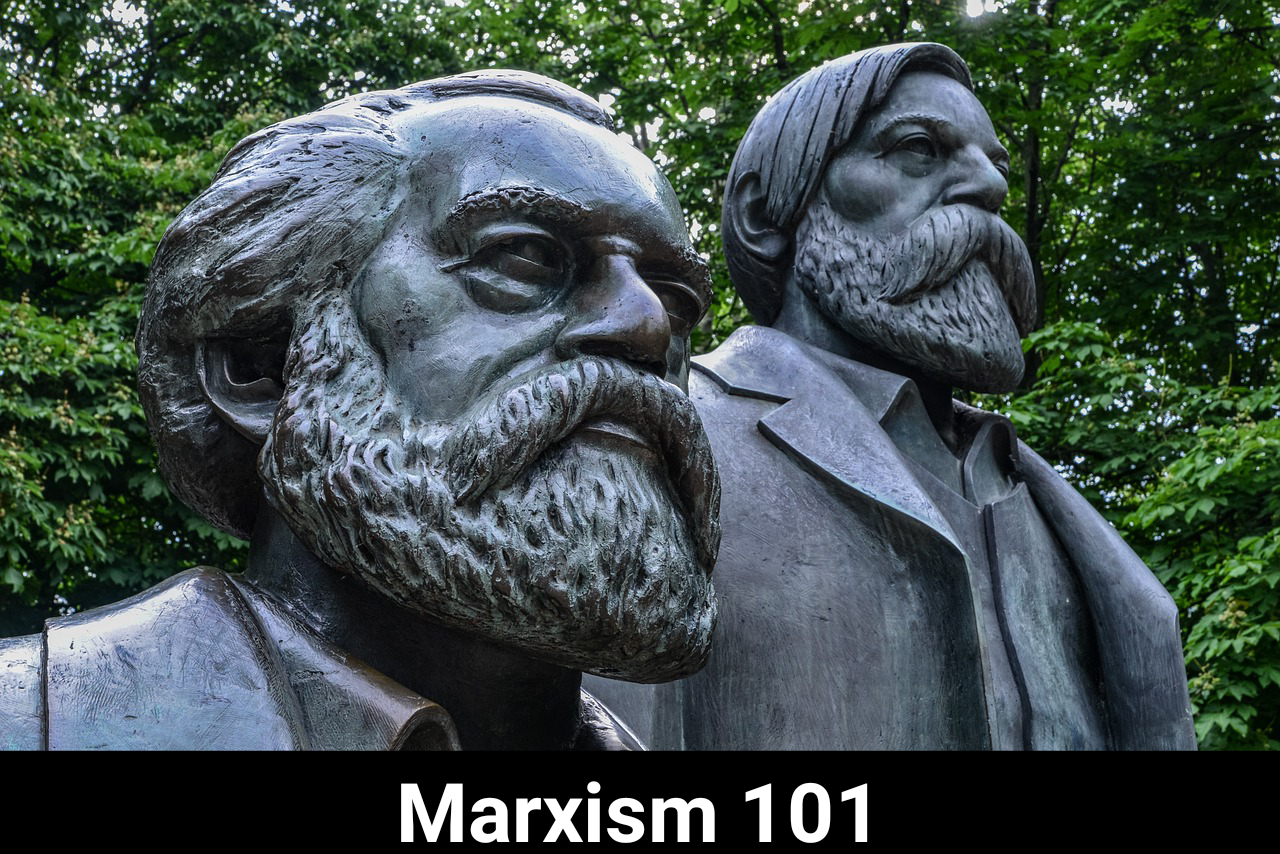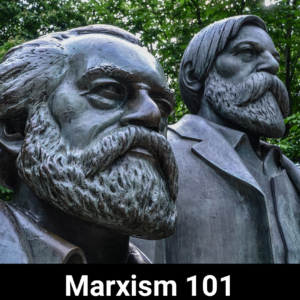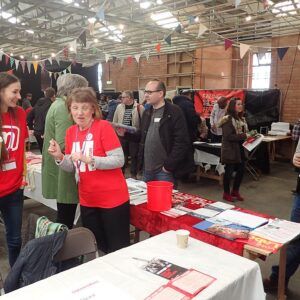Socialism is a word that you’ve likely heard used with various different meanings. In the US, the word Socialism is often used to describe the Scandinavian Social Democracies. These aren’t Socialist though. They’re Capitalist societies with strong unions and good social welfare systems, which are slowly being dismantled and privatised. But Socialism isn’t Capitalism with some concessions to working and marginalised people thrown in.
Those more to the left use the word Socialism to mean worker ownership of the Means of Production (the tools and raw materials used to produce products.) This definition is often used by Democratic Socialists to mean that workers directly owning their workplaces makes a society socialist. A market based economy of worker co-ops would fit under this definition. This is still a form of capitalism however, only with the ownership of capital more widely distributed. Capital is still put forward by each business to produce a profit.
Socialism, in the Marxist sense, is when the of the Means of Production are owned society as a whole, where production is planned based on human needs, not to produce commodities for profit. This common ownership of the Means of Production eliminates the existence of separate classes.
Social classes, we’ll remember, are defined by a person’s relationship to the Means of Production. Those who use their ownership of the Means of Production to extract value from workers through wage labour are capitalists. Those who must work for a wage provided by others in order to live are the proletariat. While those who own their own Means of Production and work for themselves are the petit bourgeoisie (small capitalists.)
Marx and Engels themselves referred to Socialism as lower phase Communism, as social classes have been eliminated at this point.
The difference between socialism and communism
No new economic and social system comes into the world fully formed; it emerges from the previous system and still bears the marks of the old system for a long time.
Communism is a stateless, classless, and moneyless society. In it, people contribute their labour according to their ability, to produce and distribute products and run the social institutions. In return, everyone receives whatever they need.
Socialism is an underdeveloped form of communism, where the economy isn’t developed enough to provide everyone with a life of material abundance, and is created by people raised within capitalism. As a result, it retains some of the capitalist ethos: that people should be paid according to their contribution to the economy.
“What we have to deal with here is a communist society, not as it has developed on its own foundations, but, on the contrary, just as it emerges from capitalist society; which is thus in every respect, economically, morally, and intellectually, still stamped with the birthmarks of the old society from whose womb it emerges. Accordingly, the individual producer receives back from society – after the deductions have been made – exactly what he gives to it. What he has given to it is his individual quantum of labor.” – Karl Marx, Critique of the Gotha Program
To move past this stage of development, the productive forces of society have to be increased to such a degree that we’re able to provide for all people’s needs. As this happens, the operation of each part of the economy becomes simplified to such an extent that people are able to move between jobs without an extensive learning phase. Think of the training required to work on a factory line versus that required to become a skilled craftsperson. This removes most privileges that come from the division of labour, since the average person can step into almost any job without much trouble.
Meanwhile, the education system and society in general give each person full rein to develop their intellectual and physical abilities, creating a society of well rounded individuals who are suited to a life of self organised, free co-operation.
The State Under Socialism
“Between capitalist and communist society there lies the period of the revolutionary transformation of the one into the other. Corresponding to this is also a political transition period in which the state can be nothing but the revolutionary dictatorship of the proletariat.” – Karl Marx, Critique of the Gotha Program
In order to reach socialism, it’s necessary for the proletariat to overthrow the capitalist class and take control of society. In this period, known as The Dictatorship of the Proletariat, the proletariat dismantles the old state machinery and puts its own institutions in place.
The state, we’ll remember, refers to the institutions that the ruling class uses to coerce the other classes in society and maintain its rule. This includes institutions of violence, such as the police and military, and also institutions of intellectual coercion, such as the education system, the media, the political and religious institutions.
The proletariat can’t simply dismantle these institutions and leave nothing in their place. It needs the state to hold down the minority of exploiters and their allies, to stop them regaining control of society. Even when stripped of its private property, the remnants of the capitalist class maintain their ideology, connections, and ambitions. It may take several generations for this group to align completely with the goals of the rest of society.
What takes the place of the state proper is a sort of semi state. While previous ruling classes were a minority ruling over a majority, and needed a complex state machine to make that happen, under socialism, the simple organisation of the armed people is enough to keep any exploiters in check. Over time, even these simple, coercive powers become unnecessary and begin to wither away. Society is able to allow them to die out as naturally as any piece of technology is abandoned when it’s outlived its usefulness.
Actually Existing Socialism (AES)
The term Actually Existing Socialism is used to refer to currently socialist countries. Today, it’s typically used to refer to: China, Cuba, Vietnam, The DPRK (North Korea), and Laos. This is a controversial term amongst Marxists, with some claiming that these countries are actually capitalist.
It’s clear from a glance that none of these countries have a fully planned economy, and that all still produce commodities (goods made for sale.) Without having socialised production, how can these countries be called socialist?
Neither these countries themselves or the Marxists who uphold them as examples of successful socialism are pretending that the economies are fully planned. You’ll remember earlier when we talked about the necessary transition period between capitalism and socialism, The Dictatorship of the Proletariat, that’s where these countries currently are.
In Lenin’s day, they originally thought that the DotP period could be over in a few years, and the economy fully socialised. Reality didn’t play out that way though. For a start, this idea rested on the assumption that the proletariat in the advanced, capitalist countries of Europe would complete their revolutions quickly after the October Revolution and help them industrialise. The German Revolution of 1918-19 was put down, however, and the British revolution never happened. The newly forming USSR was left alone and was soon under siege from the capitalist world, who invaded it with armies from 14 countries, and then sanctioned what they failed to conquer. The socialists had taken power but found themselves in a situation where a quick transition to a socialist economy was all but impossible.
The soviets instead entered a period of siege socialism, where they focused on defending the revolution and doing their best to build towards socialism without the help of the advanced economies. This is the situation that all Actually Existing Socialist states find themselves in. Socialists hold state power and are trying to construct socialism amidst sanctions, coup attempts, and sabotage from the capitalist powers.
Calling these countries socialist is a recognition that socialists hold state power and are building towards communism. Nobody is pretending that these countries have already socialised their economies. China, for instance, calls its current phase of development Primary Stage Socialism, as it’s the first stage of socialist construction.
Experience has shown that it’s more realistic to view the construction of socialism as a historical process, rather than as an event. The economies of these countries will take various forms, as they respond to the unique pressures they’re put under, but as long as the proletariat keeps state power, the struggle for socialism continues there.
Return to: Marxism 101 Course





